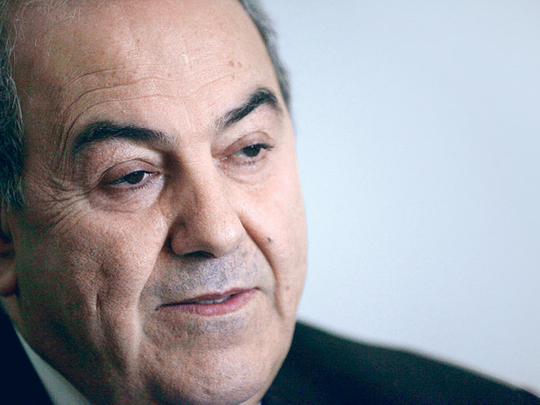
In less than two weeks, the newly elected Iraqi Parliament is scheduled to meet, now that the Supreme Court has ratified the March 7 election results, which confirm former prime minister Eyad Allawi winning 91 seats of Parliament and incumbent Prime Minister Nouri Al Maliki with 89.
Neither of them has the 163 majority needed to form a cabinet on their own (as stated in Article 76 of the Constitution), and therefore an alliance of some sort needs to emerge to bring Iraq out of the haunting vacuum created by the March elections.
Allawi, however, says that his cabinet will be ready within a week, while Al Maliki insists that only he is the legitimate prime minister of Iraq. A quick read through the Iraqi press, however, shows that no less than 10 prime minister-hopefuls are promoting themselves for the job.
What makes or breaks any of the big names earmarked for the premiership is what heavyweights in the Iran-backed Iraqi National Alliance (INA) have to say about the next government in Iraq.
Nobody understands that reality better than Al Maliki, who has been desperate for a reversal of fortunes since March. He went for a manual recount of nearly 2.5 million votes in Baghdad, but they all showed identical results, re-confirming Allawi as the next prime minister.
He tried to disqualify a handful of Allawi's allies on charges of being allied to the outlawed Baath Party, but that did not work. He is now reaching out to the INA, composed of former allies who had helped bring him to power in 2006 although he had refused to work with them last March.
Perhaps an inflated ego got in the way, or perhaps Al Maliki wanted to polish his image in the Arab world and distance himself from Iran, which was strongly endorsing the all-Shiite coalition. Or maybe, the Prime Minister feared that the INA would never stand up for him until curtain fall since within it stood strong prime minister hopefuls, like Adel Abdul Mahdi of the Supreme Iraqi Islamic Council (SIIC).
As a result, both Al Maliki and the INA failed to come out with a majority — the INA losing 70 of its seats — and thereby entire parliamentary majority.
Despite the setback, its leaders remain deeply rooted within the business elite of the Shiite community and the religious establishments, thanks to seasoned politicians like Ebrahim Al Jaafary, Moqtada Al Sadr, and Ammar Al Hakim of SIIC.
Al Sadr has made it clear that there is a low ceiling for any deal with Al Maliki since during his years in power the Prime Minister had been "ungrateful to the Sadrist bloc". Al Sadr after all, had supported Al Maliki wholeheartedly, giving him legitimacy among grassroots Shiites, while Al Maliki gave Al Sadr protection from Iraqi officialdom, turning a blind eye to the activities of his Mahdi Army.
In the summer of 2007, the alliance snapped when Al Sadr walked out, objecting to Al Maliki's refusal to call for a timetable for US troop withdrawal. Al Maliki — now seeing Al Sadr as a political embarrassment in the Arab world — treated the walk-out as a blessing in disguise. He immediately began to persecute the Sadrists, arresting thousands in the months ahead of the March 2010 elections.
Suddenly, Al Maliki realised that the most popular religious politician in all of Iraq was still Al Sadr. The man had miraculously won 40 of the 70 seats of the INA, making his blessing an absolute must for any incoming prime minister.
Al Sadr's two magic traits, protection of the young and commitment to the poor, were two skills that Al Maliki never fully understood and badly needed to strengthen his grassroots power base within Iraq. The race for Al Sadr's support is ongoing between Al Maliki and Allawi although the 37-year-old leader has made it clear that he favours neither of them for the premiership, given Allawi's secularism and the fact that he went to war against the Sadrists back in 2004.
Another natural obstacle is the position of Al Sadr's allies in the INA, being Al Hakim's SIIC. Although currently in dialogue with Al Maliki, SIIC cannot forget or forgive that it was because of Al Maliki's walk out in January 2009 that they lost 8 out of 11 provinces throughout Iraq.
The same scenario was repeated, on a larger damage scale, during the parliamentary elections of 2010 when Al Maliki insisted to run independently on his State of Law Coalition (SoL). Although talks between Al Maliki's team and SIIC have not yet been completely called off, they remain in limbo because SIIC wants its number two man, Adel Abdul Mahdi, as prime minister while Al Maliki insists only he is entitled to the job.
Last week, a furious Al Hakim fired away at Al Maliki saying: "I speak to the politicians and tell them: Come down from your ivory tower and [do away] with your personal ambitions. If it [power] lasted for others, it would never have reached you!"
The strong message vibrated loud and clear throughout the Green Zone and within Al Maliki's office. It means that the Prime Minister has finally lost both foe and ally, and is likely to seal his political ambitions, at least for now.
Sami Moubayed is editor-in-chief of Forward Magazine.










